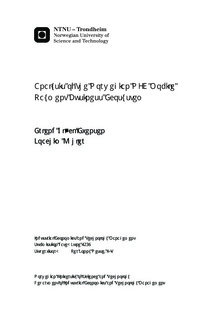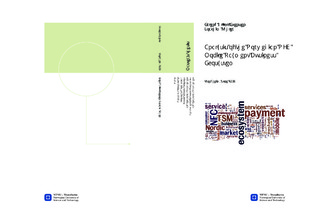| dc.description.abstract | Near Field Communication (NFC) has for a long time been assumed to become the technology that would finally bring mobile payment services to consumers on a large scale. However, a broad adoption of such services still remains to be seen. In Norway, the most prominent bank and mobile network operator created the joint venture TSM Nordic with the purpose of releasing the mobile payment wallet application, Valyou.
This payment service solution requires the establishment of a new payment ecosystem, based on the existing payment and mobile network infrastructure. The inclusion of new actors, and changing the roles of the existing ones, have made this introduction process and the resulting ecosystem both complex and challenging. After many years of testing and development, Valyou will finally be released in 2014.
This master thesis describes this business environment and its involved actors from a business ecosystem perspective. Building on a series of interviews and reviews of relevant literature, the study assesses challenges for TSM Nordic in making this ecosystem sustainable and suggests how this development can be approached.
THE NORWEGIAN NFC MOBILE PAYMENT BUSINESS ECOSYSTEM
The analysis of the conceptual mobile payment business ecosystem identifies 13 roles needed in any NFC based mobile payment ecosystem. Furthermore, the Norwegian actors within each role are presented. As the value creation in the ecosystem is proportional to the number of consumers adopting and using the mobile payment service, the four roles with direct ties to the consumer were assessed to be key roles. These are:
1) TSM, 2) bank, 3) mobile network operator (MNO) and 4) merchant
The other involved roles are equally important for the ecosystem to be fully functional, and serve as enablers for the services.
CHALLENGES IN ESTABLISHING A SUSTAINABLE ECOSYSTEM
With the basis in the described ecosystem, this report assesses the challenges of enhancing its sustainability. The findings in the study indicate that the main issue in establishing a sustainable Norwegian mobile payment business ecosystem is the chicken-and-egg paradox relating to merchant recruitment and consumer adoption being paralyzed by each other s hesitance to join the ecosystem. Related to this circular key issue, other challenges are also identified, and this can be summarized as follows:
1) Consumer adoption poses a challenge because of:
An insufficient amount of merchants having activated the necessary infrastructure
Limited market reach caused by only partial participation among banks and MNOs in addition to handsets not supporting NFC technology
An unclear value proposition towards the consumer
2) Recruitment of merchants is challenging because of:
Insufficient demand among consumers to use the service
A weak value proposition and lack of monetary incentives to activate point-of-sale terminals to enable NFC payments
Expensive payment schemes needed for NFC payment transactions which reduce merchants profit margins
Integration with existing loyalty programs not having been undertaken, making merchants unable to offer their established programs
Infrastructure investments needed to support NFC payment
THE ECOSYSTEM DEVELOPMENT AND STRATEGY FOR TSM NORDIC
The report includes a discussion of the ecosystem s possible development, and presents it as a set of evolutionary stages along with strategic recommendations for TSM Nordic to meet the identified challenges. Three evolutionary stages are discussed, and the Norwegian NFC mobile payment business ecosystem is found to currently be in its first stage of the evolution, namely the birth stage. From here, the ecosystem will either:
1) Evolve through the stages according to our assessment
2) Remain in its current stage if challenges are not resolved in a satisfactory manner, consequently making it unable to reach the next stage
3) Dissolve and cease to exist if implementation of the service fails, or if competing solutions gain a strong enough market position
In order to ensure the realization of scenario 1), and thereby enhance the sustainability of the ecosystem, the following key recommendations are presented:
TSM Nordic should adopt a keystone strategy and aim to maximize the amount of ecosystem actors connected to the Valyou platform.
Incentives for all actors to partake in the ecosystem should be continuously improved.
Barriers against competing mobile payment solutions should be created. | |

